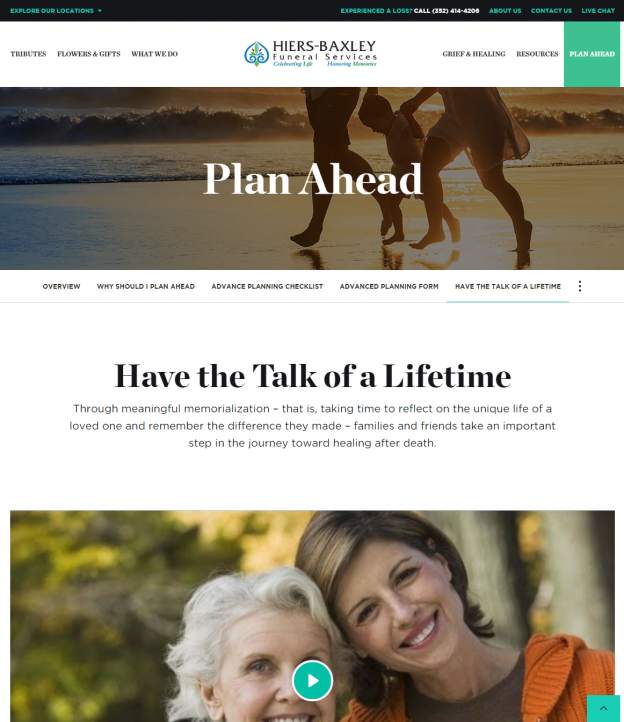A Cheat Sheet For Exploding Your Pre-Planning Leads
January 13th, 2017
“The best loved stores are not from books or films, but those from our own families.”
– Jayne McGarvey, Genealogy
Technology has transformed many aspects of our life for the better… we’re able to communicate and share information with people all over the world, we have access to more education and learning that we could ever dream of, and we have better opportunities for meaningful conversations with the families we serve.
But one aspect of our lives that technology has hit hard is real life, away-from-the-screen communication. Texting has replaced phone calls, Facebook stories have taken the place of actual storytelling, and the tradition of face-to-face memory sharing is slowly becoming a way of the past.
If you’ve been in the funeral profession your entire life, you’ve probably witnessed this first hand… when you sit down with a family in an arrangement conference to talk about their loved ones, you used to hear first hand accounts of the stories of their life. The moments that defined grandpa, or the memories that make up the highlight reel of his legacy. But slowly, as more and more people begin to count on online legacies to share their life story, answers have shifted from “My grandpa once told me…” to “I saw this posted on his Facebook page.”
Now, we’re not saying that the idea of an online legacy should be dismissed. Quite the contrary — these new ways of storytelling and sharing life moments allow families to connect with and learn about their loved ones in ways their grandparents and great-grandparents could have only dreamed of. But online storytelling isn’t enough.
What about the legacies that families don’t document on the internet, but live out in real life? The small things that people do every day that may not seem Facebook-worthy, but are the thread of life. These are the moments that families end up cherishing in the end, and they’re too often lost in time unless they are shared with the ones who mean the most to them.
Without storytelling, memory sharing, small life anecdotes and meaningful conversations, families are left grasping for more information during life’s final celebration. What would grandpa have wanted for his final send off? How would he want to be remembered? How can we personalize this service to someone who we didn’t really know?
That’s why now, in the age of online sharing and digital legacies, it’s more important than ever for funeral professionals to encourage families to begin talking, so that we can deliver a truly valuable, meaningful funeral experience when the time comes.
Why Families Need To Start Talking… Even If It’s Not About Funerals
Human beings are storytellers by nature. It’s through stories that we not only understand our world, but also who we are and where we came from. Research has shown that children who know more about their family’s history have a higher level of self-esteem, lower levels of anxiety, and even fewer behavioral problems. Why? Because understanding your history and where you came from allows you to belong to something that is bigger than yourself.
So it only makes sense that, when we are faced with times of grief, loss and discomfort, we automatically turn to storytelling. The simple act of sharing a significant memory or recounting an emotional story allows family and friends to reflect on a person’s life story, their experiences, values and interests. It’s transformative, healing and comforting. And it’s only through meaningful memorialization — that is, taking the time to reflect on the unique life a loved one and remember the impact and difference that they made — that the families we serve are able to take an important step in the journey toward healing after death. This is why pre-planning is so important.
Planning out a funeral service that embraces this idea of meaningful memorialization can only happen when people share the the things that matter most to them with their friends and family. For instance, the memories that they made, the lessons they learned, and how they hope to be remembered.
How To Get The Conversation Started
Finding a way to start talking to family members about how they wish to be remembered is one of the biggest struggles families face. But that’s not where the conversation needs to start. Simply sharing life stories, such as memorable events, people and places in life, is all it takes to get the ball rolling. And as we’ve seen time and time again, once the conversation starts, it’s hard to stop it. Families just need help getting the ball rolling.
That’s where the idea of Talk of a Lifetime Cards came from… Created by Funeral Service Foundation, in conjunction with NFDA, these approachable, non-threatening conversation prompts help families and loved ones across generations engage in conversations about what matters most.
The questions on the card range from silly to emotional, and aim to help families better understand the people they care about. Here are just a few examples of the question prompts included in the card deck:
- What has been the happiest moment of your life?
- Who was your best friend growing up? What is your fondest memory of your relationship?
- Describe the most adventurous thing you’ve ever done. How did you feel afterwards?
- What hobby or activity makes you lose track of time?
- Tell me about a time when you were proud of an accomplishment.
- Who has been the most influential person in your life? What did you learn from him or her?
- Tell me about a time you got into trouble as a child.
These cards make a great addition to a family road trip, a holiday party, a family reunion, or even something as simple as a family dinner night… any place where family members can come together to share memorable stories and memories.
The Talk of a Lifetime Cards are also a seriously invaluable tool for funeral professionals in both their community and in their funeral home. For example, your funeral home could host a fun social event at your facilities where families are invited to explore the question prompts together. You could also gift a pack of cards to senior homes or hospice facilities in the area to help promote conversations in your local community.
Using Your Website To Spark Conversations
Another great way for funeral professionals to encourage families to sit down with their loved ones and discuss the things that matter most is through education on your funeral home website.

Hiers-Baxley Funeral Services (pictured above) does a great job of using their website as an educational tool that walks people through the importance of conversation and meaningful memorialization, and even gives families free tools that will help them begin a conversation about life with their family.
“Long term care and bereavement professionals have noted that ‘Have the Talk of a Lifetime’ Conversation Cards are a powerful tool that will help their patients and families connect and share,” said Justin Baxley, of Hiers-Baxley Funeral Services. “The simple, portable, non-threatening concept is ideal to open the door to life-story and memories sharing. In fact, we have already been asked by a large [Assisted Living Facility] in our community to help facilitate a ‘have the talk’ group activity using the cards.”
Their website also has a built in pre-planning form, so families can sign up to learn more about pre-planning services and even get started planning out their own funeral… all right there on the funeral home website.
If you are ready to bring your pre-planning efforts to the next level, f1Connect is one of the best tools out there for funeral pre-planning success. Between educational content (like the Talk of a Lifetime campaign) and our revolutionary pre-planning lead form which has been shown to grow pre-planning leads by as much as 400%, it will be one of the best decisions you make for your funeral home’s success in 2017.
To get a free demo of how you can explode your pre-planning leads in 2017, click here to talk to one of our funeral success specialists today.
A big thank you to Funeral Service Foundation and Danelle O’Neill for partnering with funeralOne to provide the information featured in the post.


I found this article extremely informative and helpful. Many thanks.